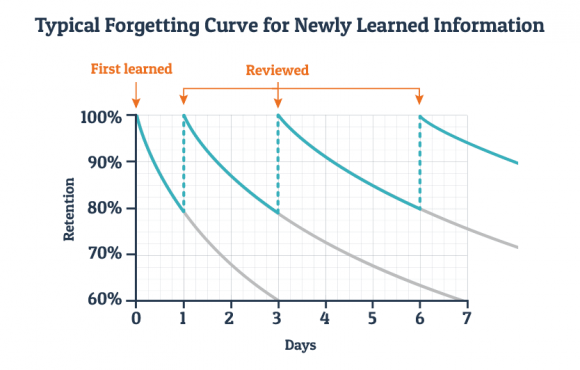Revision - A Parent's Guide
The Science Behind Effective Revision
![]() Working memory is finite, meaning we can only absorb a limited amount of information at any one time. Information is processed into our long term memory through learning. This long term memory is unlimited and we can retrieve information from here back into our working memory as needed. If students undertake enough retrieval practice, generating the information in our long term memory, it increases a level of fluency in the subject. Practice makes perfect! The forgetting curve shows how we can lose knowledge over time unless it is consciously reviewed time and time again. Consistent practice and revisiting previous material strengthens memory and boosts learning. Information if not revisited is lost from memory. Our working memory is finite and limited so cramming for revision doesn’t work.
Working memory is finite, meaning we can only absorb a limited amount of information at any one time. Information is processed into our long term memory through learning. This long term memory is unlimited and we can retrieve information from here back into our working memory as needed. If students undertake enough retrieval practice, generating the information in our long term memory, it increases a level of fluency in the subject. Practice makes perfect! The forgetting curve shows how we can lose knowledge over time unless it is consciously reviewed time and time again. Consistent practice and revisiting previous material strengthens memory and boosts learning. Information if not revisited is lost from memory. Our working memory is finite and limited so cramming for revision doesn’t work.
![]()
Recalling information from memory is simple and powerful. Retrieval practice is a learning strategy which makes you think hard and brings information to mind. It means trying to remember previously learned information as opposed to simply re-reading it. Next are some strategies that can be used for retrieval practice.

Top Tips
![]() Encourage your child to make a revision timetable - and stick to it. All of year 11 have been provided with an editable version of a revision timetable that they can personalise. This is in their Google Classroom.
Encourage your child to make a revision timetable - and stick to it. All of year 11 have been provided with an editable version of a revision timetable that they can personalise. This is in their Google Classroom.
![]()
Make sure your child has a quiet space to work, with no distractions. If you have other children make sure they know the importance of revision time. See the next section for further advice on this.
![]()
Ensure that your child has one evening a week away from their studies. They should also be taking regular breaks during the study periods. It is far more effective to do 30 minutes of successful revision rather than plough on for hours on end and not get anywhere.
![]()
A healthy diet is a must, feed your child lots of healthy snacks and proper food; not too many sugary snacks and junk food.
![]()
Sleep and exercise can also help to give your child the edge in preparing for their exams. Exercising for just 30 minutes has been proven to support the quality of sleep and will help lift stress levels.
![]()
Offer to help them with testing or ask if there is something you can do for them. Reassure them you are to support them with both their welfare and their studies.
![]()
Know the date, time and location of each exam, and support your child in incorporating this into their revision timetable. When the exam timetable is published it will be on the school website and every child will be given their own personalised version.
![]()
Most important of all, help your child to keep everything in perspective. Remind them that the better they prepare and the more confident they feel in their subject knowledge the less stressed they will feel when the exams start. But by the end of June the exams will be over and it will be the start of the long summer holidays.
Creating a workspace
Ensure the desk or room being used is free from clutter as that may make it harder to find things and cause additional stress.
Get rid of distractions - TVs, computers and phones need to be switched off. Apps are available that limit screen time.
Try to use as much natural light as possible, but this can be hard over the winter months, so try to ensure the area is well lit so your child is not straining to read their notes.
Use a clock to help manage time (not a phone - that is a distraction!)
Make sure the work space is organised with everything needed prior to starting revision, this will save time looking for the highlighter or healthy snacks!
Click on the button below to see some revision techniques.
Across school, each department use digital learning sites. Click on the link below to see a list of these sites, organised by department.